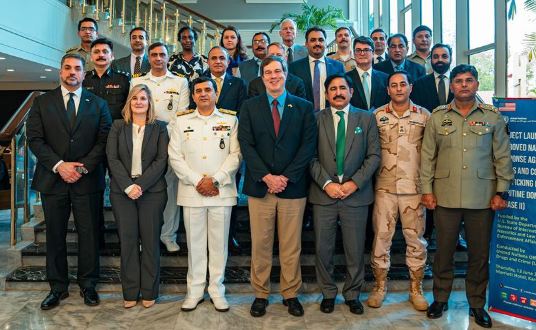KARACHI, JUN 14 /DNA/ – Chargé d’affaires (CDA) of the United States Mission in Pakistan Andrew Schofer highlighted the strong U.S.-Pakistan partnership and the United States’ commitment to enhancing maritime security, supporting religious freedom, and cultural heritage preservation during his visit from June 12 to 14.
CDA Schofer visited Mazar-e-Quaid to honor Pakistan’s founder, Quaid-e-Azam Muhammad Ali Jinnah. This visit symbolized the United States’ long and steadfast relations with Pakistan, reminding us of Jinnah’s vision for a unified, democratic Pakistan, one in which equality, social justice, and economic opportunity prevail. Both our nations hold the ideas dear and continue to perfect them through our many areas of cooperation.
A highlight of CDA Schofer’s Karachi visit was attending the launch of the $1 million Global Maritime Crime Program (GMCP) Phase-2. Funded by the U.S. government’s Bureau of International Narcotics and Law Enforcement Affairs (INL), the United Nations Office on Drugs and Crime (UNODC) leads this initiative, which will enhance maritime security and combat transnational maritime crime in Pakistan. The program also develops technologies to improve Maritime Domain Awareness (MDA) for effective maritime activity monitoring and management.
In Karachi, CDA Schofer also visited the shrine of Sufi saint Manghopir, honoring Pakistan’s rich cultural and religious diversity. He had the unique opportunity to observe and participate in the traditional ritual of feeding crocodiles at the adjoining ponds. This centuries-old practice is a significant cultural and spiritual ritual for the local community. This visit emphasized the U.S. priority of promoting religious tolerance and support for Karachi’s Sheedi community. CDA Schofer stated, “Freedom of religion is a fundamental human right essential for global stability and security.”
With the goal of promoting diversity, equity, inclusion, and accessibility (DEIA), the DCM met with various individuals from the transgender community. They talked about their experiences, challenges, and their work to improve social and economic inclusion and opportunities for their community in Pakistan.
CDA Schofer’s visit to Makli Necropolis, one of the world’s largest and oldest funerary sites, demonstrated the U.S. commitment to preserving Pakistan’s cultural heritage and fostering mutual respect. Through the Ambassadors Fund for Cultural Preservation (AFCP), the U.S. government has supported more than 32 projects in Pakistan since 2001, investing $7.6 million to restore sites like Varun Dev Temple, Frere Hall, tombs of Sultan Ibrahim and Amir Sultan Muhammad at Makli Necropolis, Mehrgarh Museum in Balochistan, and many more across Pakistan.
CDA Schofer visited Aisha Islamic Academy, a madrassah affiliated with Jamia Islamia Clifton’s madrassah for boys that educates 300 girls, including more than 100 orphans who reside on the property. This visit marks the first official U.S. delegation visit to the girls’ madrassah, underscoring the U.S. government’s dedication to inclusive education and women’s empowerment.
CDA Schofer’s trip to Karachi reflects the U.S. government’s broader approach to strengthening its partnership with Pakistan. By promoting climate resilience, human rights, maritime security, women’s empowerment, religious tolerance, and cultural heritage preservation, the U.S. Mission in Pakistan supports sustainable development and deepens bilateral ties.

















